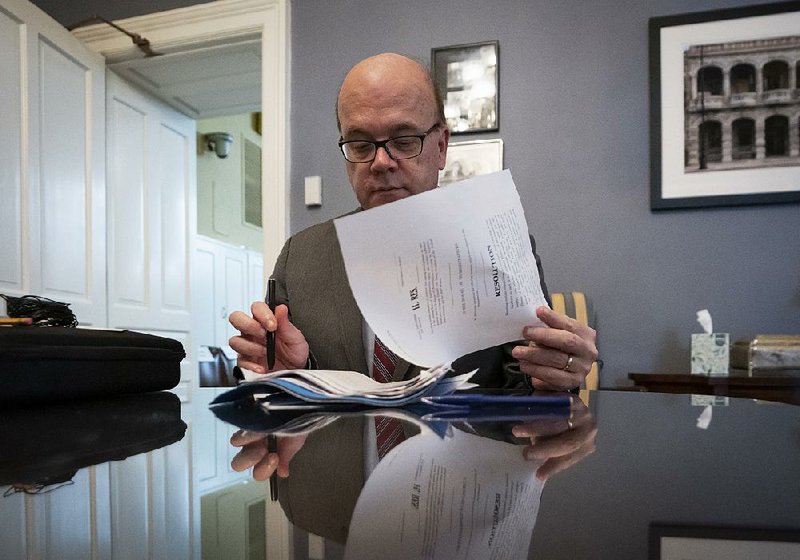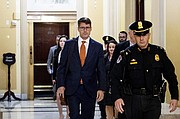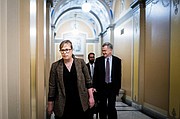WASHINGTON -- House investigators are summoning former national security adviser John Bolton to testify in their impeachment inquiry, deepening their reach into the White House as the inquiry moves toward a potential vote to remove the president.
Democratic lawmakers want to hear next week from Bolton, the hawkish former adviser who openly sparred over the administration's approach to Ukraine.
His deputies have testified that Bolton, who left the White House in September, resisted President Donald Trump's attempts to pressure Ukraine into opening investigations on Democrats, and warned that Rudy Giuliani, the president's personal lawyer, was a "hand grenade who's going to blow everybody up."
Bolton's attorney, Charles Cooper, said Wednesday evening that his client would not appear without a subpoena.
The Democrats also are calling John Eisenberg, the lawyer for the National Security Council who fielded an Army officer's concerns over Trump's phone call with the Ukraine president, and Michel Ellis, another security council official, according to a person familiar with the invitation and granted anonymity to discuss it.
The rush of possible new witnesses comes as the House prepares to take its first official vote today on the process ahead. That includes public hearings in a matter of weeks and the possibility of drafting articles of impeachment against the president.
The White House has urged officials not to testify in the impeachment proceedings, and it's not guaranteed that those called will appear for depositions, even if they receive subpoenas as previous witnesses have.
Bolton's former deputy, Charles Kupperman, has filed a lawsuit in federal court asking a judge to resolve the question of whether he can be forced to testify since he was a frequent adviser to the president. A status conference in that case was scheduled for today.
Trump and his Republican allies on Capitol Hill say the entire impeachment inquiry is illegitimate and are unpersuaded by the House resolution formally setting out next steps.
Senate Majority Leader Mitch McConnell said the format for the impeachment inquiry denies Trump the "most basic rights of due process."
Now in its second month, the investigation is focused on Trump's July phone call with Ukraine when he asked President Volodymyr Zelenskiy to investigate Democrats and a potential 2020 political rival, Joe Biden, as the White House was withholding military aid that Ukraine relies on for its defenses. Democrats contend that Trump was proposing a quid-pro-quo arrangement.
Today, the investigators are to hear from Tim Morrison, a former top GOP aide on Capitol Hill, who served on Trump's National Security Council and was among those likely monitoring the president's call with Ukraine.
Late Wednesday, it was disclosed that Morrison was resigning his White House position. He has been a central figure in other testimony about Trump's dealings with Ukraine.
NEW TESTIMONY
Earlier in the day, the Democratic and Republican House lawmakers heard fresh testimony about the Trump administration's unusual back channels to Ukraine.
Two State Department Ukraine experts offered new accounts of Trump's reliance on Giuliani rather than career diplomats to engage with the eastern European ally, a struggling democracy facing aggression from Russia.
Foreign Service officer Christopher Anderson testified that Bolton cautioned him that Giuliani "was a key voice with the president on Ukraine" and could complicate U.S. goals for the country.
Another Foreign Service officer, Catherine Croft, said that during her time on Trump's National Security Council, she received "multiple" phone calls from lobbyist Robert Livingston -- a former top Republican lawmaker once in line to become House speaker -- telling her that the U.S. ambassador to Ukraine, Marie Yovanovitch, should be fired.
"It was not clear to me at the time -- or now -- at whose direction or at whose expense Mr. Livingston was seeking the removal of Ambassador Yovanovitch," she said in prepared remarks obtained by The Associated Press.
Livingston characterized Yovanovitch as an "'Obama holdover' and associated with George Soros," she said, referring to the American financier who is often the subject of conservative criticism in the U.S. and Europe.
Public hearings are expected to begin in mid-November. Democrats are eager to hear from some top witnesses who already have provided compelling testimony privately, including diplomat William Taylor, a top ambassador in Ukraine, and Alexander Vindman, the Army officer who testified Tuesday that he twice reported to superiors, including Eisenberg, his concerns about Trump's actions toward Ukraine.
Vindman is willing to testify publicly, according to a person familiar with the situation and granted anonymity Wednesday to discuss it.
Both career diplomats testifying Wednesday had served as top aides to the former U.S. special envoy to Ukraine, Kurt Volker, who was the first to testify in the impeachment inquiry and whose cache of text messages provided key insight into Trump's requests of the new Ukraine president.
Croft, who testified for nearly five hours, described being told at an administration meeting that security funds for Ukraine were being put on hold "at the direction of the president," corroborating other accounts that have been provided to investigators.
In his opening statement, Anderson traced his unease with developments that he felt threatened to set back relations between the U.S. and Ukraine.
He told investigators that senior White House officials blocked an effort by the State Department to release a November 2018 statement condemning Russia's attack on Ukrainian military vessels.
Both witnesses were instructed by the administration not to testify but appeared in response to subpoenas from the House, according to a statement from their attorney, Mark MacDougall.
The lawyer told lawmakers that neither of his clients is the whistleblower whose complaint triggered the impeachment inquiry and that he would object to any questions aimed at identifying that person.
LEADERS PICKING SIDES
Meanwhile, both parties' leaders have been rounding up votes as a roll call approaches, with each side eager to come as close to unanimity as possible.
Republicans said a solid GOP no vote would signal to the Senate that the Democratic push is a partisan crusade against a president they have never liked. House Minority Leader Kevin McCarthy, R-Calif., said he's unaware of any Republican even "leaning toward voting for it."
If the House impeaches Trump, the Republican-controlled Senate would decide whether to remove him from office.
Rep. Fred Upton, R-Mich., a moderate who some thought might be open to backing the Democratic rules, said he would oppose them. He complained about the secrecy that Democrats have used and said he would not be pressured by GOP leaders or Trump.
"You really can't roll back the clock" from the time the investigation began last month, Upton said.
Democrats also were hoping to stay united to demonstrate solidarity.
"We all want to just follow the facts, apply the law, be guided by the Constitution, present the truth to the American people, and a vote tomorrow is a step in that direction," said Rep. Hakeem Jeffries, D-N.Y., a member of the Democratic leadership.
He said he believes "the overwhelming majority" of Democrats will back the measure.
House Speaker Nancy Pelosi, D-Calif., decided to have the vote after weeks of GOP claims that the inquiry was invalid because the chamber has not voted to formally commence the work.
The rules lay out the process by which the House Intelligence Committee -- now leading the investigation by deposing diplomats and other officials privately -- would transition to public hearings.
That panel would issue a report and release transcripts of the closed interviews it has been conducting.
The Judiciary Committee would then decide whether to recommend that the House impeach Trump.
Republicans could issue subpoenas for witnesses to appear only if the entire panel approved them -- in effect giving Democrats veto power over such requests by the GOP.
Attorneys for Trump could participate in the Judiciary Committee proceedings. But panel Chairman Jerrold Nadler, D-N.Y., would be allowed to deny "specific requests" by Trump representatives if the White House continues refusing to provide documents or witnesses sought by Democratic investigators.
The rules also direct House committees "to continue their ongoing investigations" of Trump.
Also Wednesday, Rep. Matt Gaetz, R-Fla., a key Trump ally in the impeachment fight, announced that he is filing an ethics complaint against House Intelligence Committee Chairman Adam Schiff, D-Calif., who is leading the inquiry.
Speaking to reporters outside the secure room where depositions take place, Gaetz said the complaint stemmed in part from Schiff's opening statement at an Intelligence Committee hearing last month.
During his remarks, Schiff presented an embellished version of Trump's July call with Zelenskiy. At the time, Schiff said he was conveying "the essence" of what Trump had relayed to Zelenskiy. Schiff later said it was meant as a parody, something that he said should have been apparent to Trump and others who have been critical.
"He acted in a way that was not consistent with House rules and not consistent with House ethics," Gaetz said.
Trump also has repeatedly cited the episode as he has railed against the House-led inquiry.
Gaetz also cited an episode earlier this month in which he attempted to enter a deposition and was removed by Schiff because he does not sit on one of the three committees leading the inquiry.
Information for this article was contributed by Lisa Mascaro, Eric Tucker, Mary Clare Jalonick, Zeke Miller, Padmananda Rama, Matthew Daly, Alan Fram and Andrew Taylor of The Associated Press; by Nicholas Fandos and Adam Goldman of The New York Times; and by Felicia Sonmez and John Wagner of The Washington Post.
A Section on 10/31/2019


